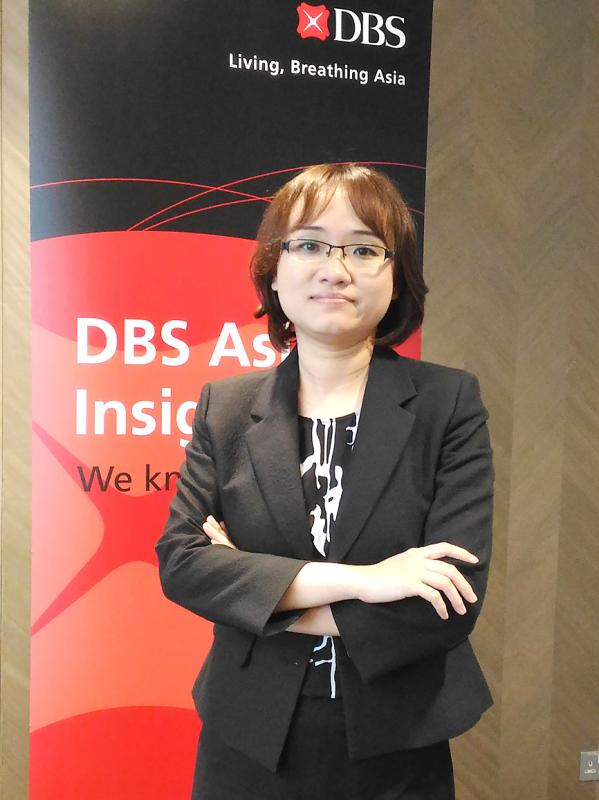The central bank is expected to maintain selective credit controls for the third time if local banks’ aggregate mortgage lending continues rising at a double-digit rate, DBS Bank Ltd’s Singapore-based chief economist Ma Tieying (馬鐵英) said yesterday.
The central bank on Dec. 7 last year imposed new selective credit controls on real-estate financing and further tightened its grip on March 18. These entailed imposing a cap on the loan-to-value (LTV) ratio, which now stands at 55 percent for individuals who want to buy a third house and 50 percent for those who plan to buy a fourth one, central bank data showed.
The LTV ratio is the ratio of the amount of mortgage to the appraised value of the property. The ratio is capped at 40 percent for corporate buyers, regardless of whether they are buying their first or second property, the central bank said.

Photo: Lee Chin-hui, Taipei Times
The central bank’s recent tightening moves were not the most severe in Taiwan’s history, Ma told a news conference.
“In 2014, the central bank set a limit on the LTV ratio for individual buyers who wanted to buy a second house, and reduced the cap on the ratio for those who wanted to buy a third house to 50 percent,” Ma said. “There is still room for the central bank to further squeeze credit controls.”
The bank is expected to take the pace of increase in mortgages into account, rather than the growth rate in housing prices, when deciding if it should tighten credit controls for the third time, she said.
“House prices have not risen by a double-digit percentage in Taiwan, but the growth in mortgages has even outpaced Taiwan’s GDP growth, suggesting that the mortgage-to-GDP ratio has increased,” Ma said.
The central bank would be concerned if the average mortgage-to-household income ratio expands, as it would indicate a rising household leverage ratio and increasing instability in the financial system, she said.
Asked if the central bank might be worried that credit controls would hurt the property market and curb an economic recovery, Ma said that the bank would prioritize financial stability over a single sector.
DBS has revised up its forecast for Taiwan’s inflation to 1.5 percent from 1 percent, and expects the central bank to use three tools to ease inflation concerns: stepping up open-market operations, tightening selective credit controls and hiking the reserve requirement ratio.
“There is a more than 50 percent chance that the central bank would use the first two tools, as it had done before. The possibility is lower for the third instrument,” Ma said.

When Lika Megreladze was a child, life in her native western Georgian region of Guria revolved around tea. Her mother worked for decades as a scientist at the Soviet Union’s Institute of Tea and Subtropical Crops in the village of Anaseuli, Georgia, perfecting cultivation methods for a Georgian tea industry that supplied the bulk of the vast communist state’s brews. “When I was a child, this was only my mum’s workplace. Only later I realized that it was something big,” she said. Now, the institute lies abandoned. Yellowed papers are strewn around its decaying corridors, and a statue of Soviet founder Vladimir Lenin

UNCERTAINTIES: Exports surged 34.1% and private investment grew 7.03% to outpace expectations in the first half, although US tariffs could stall momentum The Chung-Hua Institution for Economic Research (CIER, 中華經濟研究院) yesterday raised its GDP growth forecast to 3.05 percent this year on a robust first-half performance, but warned that US tariff threats and external uncertainty could stall momentum in the second half of the year. “The first half proved exceptionally strong, allowing room for optimism,” CIER president Lien Hsien-ming (連賢明) said. “But the growth momentum may slow moving forward due to US tariffs.” The tariff threat poses definite downside risks, although the scale of the impact remains unclear given the unpredictability of US President Donald Trump’s policies, Lien said. Despite the headwinds, Taiwan is likely

UNIFYING OPPOSITION: Numerous companies have registered complaints over the potential levies, bringing together rival automakers in voicing their reservations US President Donald Trump is readying plans for industry-specific tariffs to kick in alongside his country-by-country duties in two weeks, ramping up his push to reshape the US’ standing in the global trading system by penalizing purchases from abroad. Administration officials could release details of Trump’s planned 50 percent duty on copper in the days before they are set to take effect on Friday next week, a person familiar with the matter said. That is the same date Trump’s “reciprocal” levies on products from more than 100 nations are slated to begin. Trump on Tuesday said that he is likely to impose tariffs

HELPING HAND: Approving the sale of H20s could give China the edge it needs to capture market share and become the global standard, a US representative said The US President Donald Trump administration’s decision allowing Nvidia Corp to resume shipments of its H20 artificial intelligence (AI) chips to China risks bolstering Beijing’s military capabilities and expanding its capacity to compete with the US, the head of the US House Select Committee on Strategic Competition Between the United States and the Chinese Communist Party said. “The H20, which is a cost-effective and powerful AI inference chip, far surpasses China’s indigenous capability and would therefore provide a substantial increase to China’s AI development,” committee chairman John Moolenaar, a Michigan Republican, said on Friday in a letter to US Secretary of